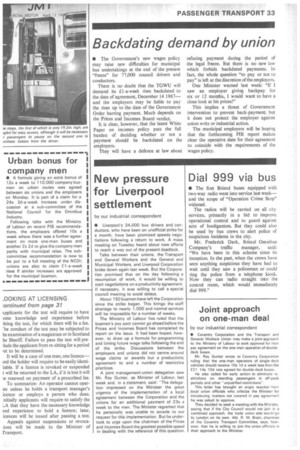Backdating demand by union
Page 35

If you've noticed an error in this article please click here to report it so we can fix it.
• The Government's new wages policy may raise new difficulties for municipal bus undertakings at the end of the present "freeze" for 77,000 council drivers and conductors.
There is no doubt that the TGWU will demand its £1-a-week rises backdated to the date of agreement, December 14 1967— and the employers may be liable to pay the rises up to the date of the Government Order barring payment. Much depends on the Prices and Incomes Board verdict.
It is clear, however, that the latest White Paper on incomes policy puts the full burden of deciding whether or not a payment should be backdated on the employers.
They will have a defence at law about refusing payment during the period of the legal freeze. But there is no new law which forbids backdated payments. In fact, the whole question "to pay or not to pay" is left at the discretion of the employers.
One Minister warned last week: "If I saw an employer giving backpay for six or 12 months, I would want to have a close look at his prices!"
This implies a threat of Government intervention to prevent back-payment; but it does not protect the employer against union writs or industrial action.
The municipal employers will be hoping that the forthcoming PIB report makes clear the operative date for their agreement to coincide with the requirements of the wages policy.




































































































